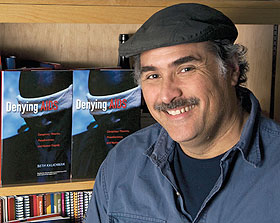  |
| HOME | THIS ISSUE | CALENDAR | GRANTS | BACK ISSUES | < BACK | NEXT > |
Psychologist's book examines harmful effects of AIDS denialismby Beth Krane - March 23, 2009
|
||||
| “HIV is not sexually transmitted.” “HIV does not cause AIDS.” “Anti-retroviral medications are poison.” These are the varied claims of a small, yet growing and dangerous, group of AIDS denialists Seth Kalichman exposes in a new, popular press book, Denying AIDS: Conspiracy Theories, Pseudoscience, and Human Tragedy.
“This book doesn’t aim to refute the AIDS denialist movement. The science of HIV/AIDS is established fact,” says Kalichman, a professor of social psychology at UConn. “This is a psychological autopsy of AIDS denialism, a rare look inside the movement’s wacky and destructive world.” Denying AIDS is the first book to offer an American perspective on AIDS denialism and to examine its harmful influence on some of the countries hardest hit by the epidemic. In addition to “diving into the world of AIDS denialism” through books, magazines, and the Internet, Kalichman corresponded and conversed with proponents of AIDS denialism to gain insights into the movement. AIDS denialism, he writes, is akin to global warming denialism, Holocaust denial, the 9/11 Truth Movement, and other forms of denialism, in that it uses “myths, misconceptions, and misinformation to distort and refute reality and create the appearance of legitimate scientific debate.” Most scientists are surprised to learn that AIDS denialists still exist, according to Kalichman. AIDS denialism, however, is a growing problem, and it is propped up by AIDS “pseudo science” circulating largely on the Internet through web sites, blogs, and even pseudo-scientific journals made to look like their legitimate, peer-reviewed counterparts. Creating the illusion of credibility are a small group of professors with ties to well regarded universities, supportive articles in mainstream media outlets such as Harper’s Magazine, and celebrity endorsements, such as from the popular rock band The Foo Fighters, Kalichman writes. Nicoli Nattrass, a South African AIDS activist, researcher, and author, writes in the foreword to Denying AIDS: “There is a real risk that a new generation of Americans could be persuaded that HIV does not exist or is harmless, that safe sex is not important, and that they do not need to protect their children from this deadly virus. A resurgence of denialism in the United States would have far-reaching effects on the global AIDS pandemic, just as it already has in South Africa.”
Two other recent studies also underscore the harmful influence of AIDS denialism:
Kalichman shines a light on the erroneous reasoning and unscientific approaches of AIDS denialists and explains how the denialists nevertheless gain ground. They are masters of rhetorical devices and focus on communicating with the general public. Scientists, by contrast, tend to communicate better with each other than with the general public. Denying AIDS, a trade book published by Copernicus Books/Springer Science and written with a science journalist as a coach, seeks to reverse that trend. In his final chapter, Kalichman offers tips for evaluating the claims of AIDS denialists, including: avoid falling into “single-study fallacies;” consider where information is published and how dated it is; don’t give credibility to information simply because it sounds technical; and use common sense. “Think about the gay men who never used drugs, who had been perfectly healthy and died of AIDS before there were antiretroviral medications …,” he writes. “Think about Africa. Is there any rationality in saying that AIDS is caused by poverty, when some of the most impoverished countries in the world have no AIDS while southern Africa’s richest country has among the largest AIDS problems? Blaming AIDS on drug abuse, HIV treatments, and poverty is an affront to every person living with the disease.” When he is not delving into the world of AIDS denialism, Kalichman, a principal investigator at UConn’s Center for Health, Intervention and Prevention (CHIP) and director of the Southeast HIV/AIDS Research and Evaluation Project (SHARE), conducts HIV/AIDS prevention and treatment research in Atlanta and South Africa. He is donating the proceeds from Denying AIDS to the Family Treatment Fund, administered by Massachusetts General Hospital, to purchase antiretroviral medications for people living with HIV/AIDS in Africa. |
| ADVANCE HOME UCONN HOME |

